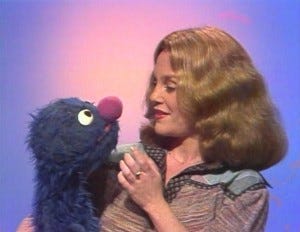For a kid who “doesn’t talk,” my autistic son uses his voice all the time. Since he started verbalizing (after he turned 3), he’s rarely been quiet. He chatters, sings, and repeats movie dialogue, computer game sound bites, and phrases from toys and books almost constantly. It’s called “echolalia” – an immediate or delayed repetition of another person’s speech. Children learning to talk will often parrot in this way, but the phenomenon can be lifelong for some on the spectrum.
A favorite classic Sesame Street moment brought to life. "Be My Echo" by Grover and Madeline Kahn
My son’s verbal mimicking often seems disconnected from what is going on around him. He simply likes to play around with the noises in his head.
For a few months during his early elementary school years, he could be overheard reciting his school’s morning announcements, including various items on the lunch menu, reminders to “stand up and be counted for your lunch selection,” and (with her exact inflection), the principal’s cheery sign-off: “Have a super great day!”
Other times, my son’s use of memorized words is clearly intentional:
One school morning, his response to my repeated attempts to hurry him out the door was a snarky request (spoken by Shrek to his annoying friend Donkey):
“Could you NOT be yourself…for FIVE MINUTES!”
Another time, after I told my teenager that no, he can’t have cupcakes for breakfast, I heard him grumble (in the words of the displeased boss of Bob Parr/Mr. Incredible):
“I’m not happy, Bob. Not. Happy.”
Perfectly applied script, kid. No, you still can’t have cupcakes.
His echolalia is often sparked by hearing a familiar word:
I was talking to him once about feeling nervous regarding a change in his schedule, and I was so proud to hear him respond with a full sentence: “I get so nervous!” Then, he followed that up with “Rawr! Were you scared? Tell me, honestly,“ so then I knew I was really speaking to the neurotic dinosaur Rex from Toy Story.
It’s super fun to be shown that our own words can be memorized as easily as the movies he’s watched thousands of times. If I say “Don’t touch,” he might complete that phrase with “…the boat” (Nemo’s dad) or a familiar warning he’s heard from us here in the desert, “…the cactus.”
Just as he prefers order and familiarity in his visual environment, my kid expects the verbal exchanges in his “soundscape” to follow known patterns. So, we often get corrected when we say something he deems incomplete.
When I’d say, “Stop it” using a particular tone, he would often finish it for me “...right now!”
My heavy sigh alone when trying to wrangle my procrastinating kid into the shower, might be enough to cause a delayed echo of what he assumes will be my next statement: “...driving me crazy!”
Truly, the accuracy of his auditory memory has revealed things about my verbal habits which I’d prefer not to have repeated,
One morning, in our overcrowded garage, my hands were full and I was trying to get him to open the car door for me. He was confused by this unfamiliar request and kept opening my door but getting in the car himself, perplexed to be sitting in the driver’s seat, immediately getting back out, but then shutting the door before I could get in. Both of us were getting increasingly frustrated and I lost my patience and spat out, “God...!” My kid paused, then completed my censored thought under his breath, “...dammit!”
Oops.
His echolalia can be triggered by a situation that has a similar sensory or emotional context to the one in which he first heard the word or phrase. So, being told “No candy” in the Target check-out line might make him feel frustrated and tempted to lash out, which reminds him of the things people say if he hits someone, which might cause the whole of Target to hear a child yelling, “No hitting! Stop it..right now! Don’t hit! That hurts me!” as his mother tries to decide if backing away with hands held up looks more guilty.
Apparently, I have very predictable verbal patterns in stressful situations. These words come back to haunt me, or in some cases, to turn the tables.
After returning home from a chiropractic appointment, my nine-year-old son found himself sitting across the kitchen table from a highly flustered parent who had failed after forty-five excruciating minutes to get her son to lie down to receive a simple five-minute adjustment (something he’d been doing for months without an issue). No amount of pleading, bribing or modeling could inspire his cooperation, and I had brought him home (after paying the doctor, of course) feeling embarrassed and highly incompetent as a parent.
At the kitchen table, I launched into a lecture on the importance of following directions at the doctor’s office, rapidly losing the battle to get my stress under control. This scenario must have reminded my son of one of those “helpful” things his Mom says to him when he is upset.
Result: My son, who rarely strings more than two words together with communicative intent, leaned across the table, put his hand on mine, looked me in the eye and said, “It’s not a big deal.”
I responded with “It is a big deal—” before I realized what just happened and broke down laughing.
Thanks, kid, that is the right perspective.
It’s funny how my Echo can use words he equates with stress to completely diffuse mine.
2025 note: This is a revised version of an essay that first appeared on my blog in 2012. We still hear some of these echoes today—echolalia is still very much a part of how my son learns language and shows me what he is thinking.


